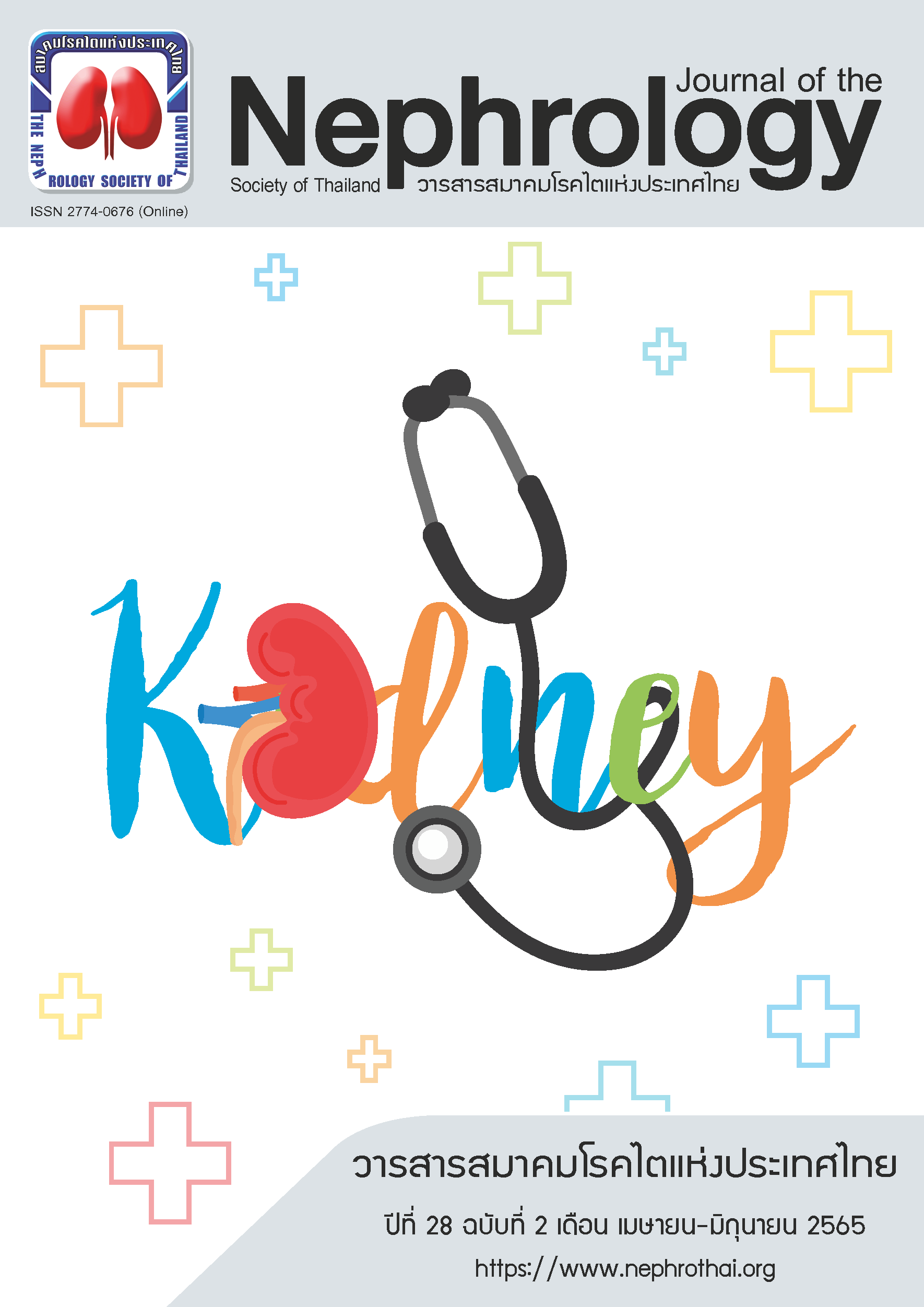Role of tolvaptan to treat acute heart failure
Main Article Content
Abstract
Acute decompensated heart failure is a common condition that increases morbidity and cardiovascular mortality. Most patients often suffer from dyspnea. The main treatments are to treat precipitating causes of acute heart failure and to use diuretics to eliminate water and salt from the body. After a high dose of diuretic treatment for several patients, the signs and symptoms of acute heart failure cannot be improved and some side effects from hypokalemia, metabolic alkalosis, and worsening renal function develop. For those reasons, a new oral vasopressin receptor antagonist (VRA), i.e., tolvaptan, has been developed. It decreases the function of the aquaporin 2 channel at the distal collecting duct, inhibits reabsorption of water, and produces a clear aquaretic effect. Tolvaptan has been approved by the United States Food and Drug Administration to treat hypervolemic hyponatremia from heart failure and euvolemic hyponatremia from the syndrome of inappropriate antidiuretic hormone. Furthermore, several clinical studies show that tolvaptan improves congestive symptoms, promotes weight loss, increases urine output in patients with heart failure without affecting other electrolytes and maintains renal function.
Article Details

This work is licensed under a Creative Commons Attribution-NonCommercial-NoDerivatives 4.0 International License.
This article is published under CC BY-NC-ND 4.0 license, which allows for non-commercial reuse of the published paper as long as the published paper is fully attributed. Anyone can share (copy and redistribute) the material in any medium or format without having to ask permission from the author or the Nephrology Society of Thailand.
References
Ariyachaipanich A, Krittayaphong R, Kunjara Na Ayudhya R, Yingchoncharoen T, Buakhamsri A, Suvachittanont N. Heart Failure Council of Thailand (HFCT) 2019 Heart Failure Guideline: Introduction and Diagnosis. J Med Assoc Thai 2019;102:231-9.
Cadnapaphornchai MA, Gurevich AK, Weinberger HD, Schrier RW. Pathophysiology of sodium and water retention in heart failure. Cardiology, 2001. 96(3-4): 122-31.
Schrier RW, Abraham WT. Hormones and hemodynamics in heart failure. N Engl J Med, 1999. 341(8): 577-85.
Weber KT. Aldosterone in congestive heart failure. N Engl J Med. 2001; 345(23):1689-97.
Vinod P, Krishnappa V, Chauvin AM, Khare A, Raina R. Cardiorenal Syndrome: Role of Arginine Vasopressin and Vaptans in Heart Failure. Cardiol Res. 2017; 8(3):87-95.
ter Maaten JM, Valente MA, Damman K, Hillege HL, Navis G, Voors AA. Diuretic response in acute heart failure-pathophysiology, evaluation, and therapy. Nat Rev Cardiol. 2015; 12(3):184-92.
Ellison DH. Diuretic therapy and resistance in congestive heart failure. Cardiology. 2001;96(3-4):132-43.
Testani JM, Brisco MA, Kociol RD, Jacoby D, Bellumkonda L, Parikh CR, et al. Substantial Discrepancy Between Fluid and Weight Loss During Acute Decompensated Heart Failure Treatment. Am J Med. 2015; 128(7): 776-83.e4.
Testani JM, Hanberg JS, Cheng S, Rao V, Onyebeke C, Laur O, et al. Rapid and Highly Accurate Prediction of Poor Loop Diuretic Natriuretic Response in Patients With Heart Failure. Circ Heart Fail. 2016; 9(1): e002370.
Damman K, Testani JM. The kidney in heart failure: an update. Eur Heart J. 2015; 36(23):1437-44.
Phakdeekitcharoen B, Boonyawat K. The added-up albumin enhances the diuretic effect of furosemide in patients with hypoalbuminemic chronic kidney disease: a randomized controlled study. BMC Nephrol. 2012; 13:92.
Sweet DH, Bush KT, Nigam SK. The organic anion transporter family: from physiology to ontogeny and the clinic. Am J Physiol Renal Physiol. 2001; 281(2):F197-205.
Wilcox CS, Mitch WE, Kelly RA, Skorecki K, Meyer TW, Friedman PA, et al. Response of the kidney to furosemide. I. Effects of salt intake and renal compensation. J Lab Clin Med. 1983; 102(3):450-8.
Brater DC. Diuretic therapy. N Engl J Med. 1998; 339(6):387-95.
Grodin JL, Stevens SR, de Las Fuentes L, Kiernan M, Birati EY, Gupta D, et al. Intensification of Medication Therapy for Cardiorenal Syndrome in Acute Decompensated Heart Failure. J Card Fail. 2016; 22(1):26-32.
Schrier RW, Fassett RG, Ohara M, Martin PY. Vasopressin release, water channels, and vasopressin antagonism in cardiac failure, cirrhosis, and pregnancy. Proc Assoc Am Physicians. 1998; 110(5):407-11.
Aditya S, Rattan A. Vaptans: A new option in the management of hyponatremia. Int J Appl Basic Med Res. 2012; 2(2):77-83.
Mayinger B, Hensen J. Nonpeptide vasopressin antagonists: a new group of hormone blockers entering the scene. Exp Clin Endocrinol Diabetes. 1999;107(3):157-65.
Yamamura Y, Ogawa H, Yamashita H, Chihara T, Miyamoto H, Nakamura S, et al. Characterization of a novel aquaretic agent, OPC-31260, as an orally effective, nonpeptide vasopressin V2 receptor antagonist. Br J Pharmacol. 1992; 105(4):787-91.
Ali F, Guglin M, Vaitkevicius P, Ghali JK. Therapeutic potential of vasopressin receptor antagonists. Drugs. 2007;67(6):847-58
Decaux G, Soupart A, Vassart G. Non-peptide arginine-vasopressin antagonists: the vaptans. Lancet. 2008; 371(9624):1624-32.
Farmakis D, Filippatos G, Kremastinos DT, Gheorghiade M. Vasopressin and vasopressin antagonists in heart failure and hyponatremia. Curr Heart Fail Rep. 2008; 5(2):91-6.


